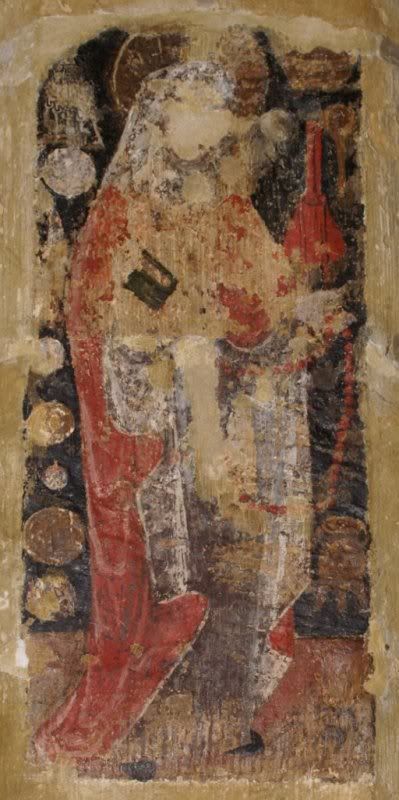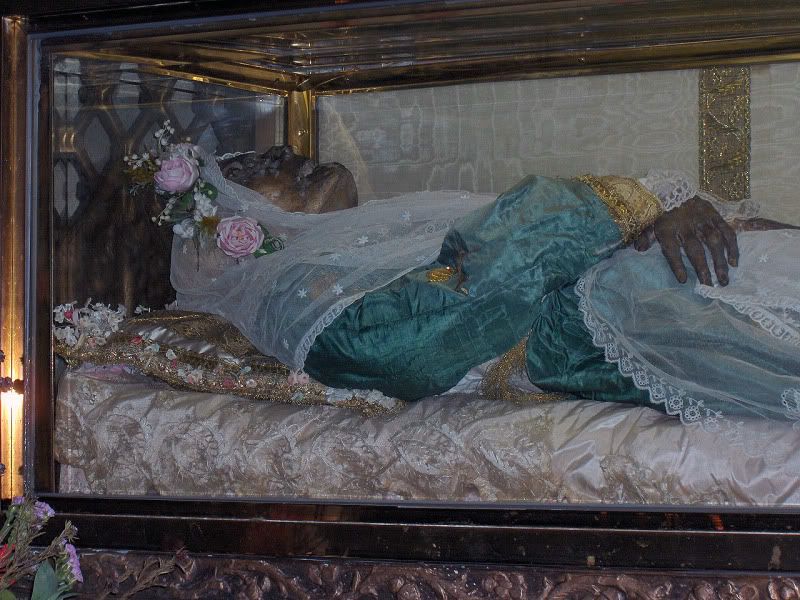Today, April 27, is the feast of Saint Zita (1212-1272), virgin of the Church, patron saint of housework, servants, and lost keys. The life of Saint Zita is a simple one, filled with a profound love of the Lord, compassion and service to others, and daily toil. Throughout her lift, Zita suffered hardship, hard work, jealousy and mockery, yet never strayed from her path of holy patience, joyful suffering, obedience, and industry. For Saint Zita, and indeed for us, holiness was found not only in helping others, but also in hard work (reminding us of Proverbs 6:6, “Look to the ant, you sluggard! Consider it’s ways and be wise!")
Saint Zita was born to a poor working family in a village in Tuscany, Monsagrati. She was raised by her pious and hard-working parents, and taught to realize that there were more important things than gold or money—Christian virtues of love, kindness, and compassion towards others. Despite hard work, the family often went hungry, too poor to buy enough food, and suffering terribly during the cold of winter.
From a young age, Zita was recognized for her obedience, goodness, and charity. She ran with the love of a child to church each day, kneeling and praying of her own accord until her parents bade her come home. She frequently spoke of how she envisioned the Baby Jesus being born into similarly poor circumstances, but giving all He had, wandering the world, helping the poor.
At age 12, Zita was sent to live with a wealthy family in nearby Lucca, hired as a domestic servant. Her mother instructed her to serve the family well, for in serving her master, she was serving the Lord. Zita cheerfully undertook her work, striving to do her best at every task. Her zeal for her work, cheerful attitude, and industriousness immediately made her the envy of the other household servants. They treated her poorly, beating her, mocking her, and shirking their own responsibilities in the knowledge that she would do the work for them. Zita worked tirelessly, never complaining to her masters or the others.
Zita worked for the same family for the next 48 years, until her death. During that time, she rose long before the rest of the household each morning, walking a distance to the local church and attending morning Mass. She would then return to the household, bake bread for the family, and set about her daily chores until she went to bed late in the evening. Despite her busy schedule, Zita found time to serve the poor, never wasting leftover household food. While her master was initially irritated by her generosity to those in need, over time, her patience and holy disposition won him over. Under her generosity and careful oversight, the household supplies multiplied!
Throughout her life, Zita worked many miracles, and the heavenly host themselves intervened on her behalf. One morning at church, Zita was so engrossed in her prayers, she forgot to return home to bake the household bread. When she realized the time, she ran back to the house, out of breath, only to find freshly baked, perfect loaves, scented with the perfume of heaven. Her fellow servants reported that angels of heaven had baked the bread, and from that day, treated Zita with respect and dignity. The household had never tasted such incredibly delicious—truly heavenly—bread!
On another occasion, during the heat of summer, a poor traveler came to the door of the kitchen asking only for a drink of water. Zita knew that due to the heat, the water from the family well was unsafe to drink without treating it first. Yet, the traveler insisted that he only take water from the well, so as not to inconvenience her. Aloud, she spoke, “I wish this water were wine,” which the traveler echoed. Upon drawing the water from the well and drinking it, he found, indeed, that the Lord had transformed the well water into wine, per Zita’s prayer.
Lastly, on the feast of Christ the King, one bitter winter morning, Zita set off for church only to hear her master’s voice from the doorway calling her. As it was so cold, he suggested she stay home, but Zita was not to be deterred from visiting the Lord on His feast day at church. The master, fearing for her health, provided her with his warm, soft cloak—to be returned to him when she came back. The cloak was the most luxurious garment Zita had ever worn, and while comfortable, it filled her with guilt and regret as she prayed at the church. Christ had never had such comfortable clothing, and here, His humble servant, Zita, was wearing better garments than her king. At that moment, she noticed a poor beggar man, kneeling in church, shivering. She wrapped him in the cloak, instructing him that it needed to be returned to her at the end of the prayers, so she could return it to her master.
At the end of Mass, when she turned to invite the beggar home to warm himself by the kitchen hearth, she found him gone. Afraid, and certain of the beating she was to receive, Zita trudged through the cold winter morning, finding her master at the door. As expected, he was livid, and began violently reprimanding her, when the beggar man appeared at her side, his face shining with golden light. He returned the coat, both Zita and her master realizing him to be an angel of the Lord. From that moment on, Zita’s master treated her with respect and dignity, eventually entrusting her with the keys to the manor house, and placing her in charge of its operations. The home became a center of charity and Christian love—with each charitable act to those in need, whether they be poor, criminals, the ill, only increasing the fortune of the household!
Saint Zita died comfortably in the home she oversaw in 1272. At the moment of her death, a bright star appeared in the sky above the home, where it remained. Her funeral drew all the townspeople, who proclaimed that a saint had lived among them, and strained to kiss her hand or touch her garment sleeves. Many miracles were performed at her tomb. In the sixteenth century, nearly 300 years after her death, Saint Zita’s body was exhumed to be moved, and found to be incorrupt. It lies now, encased in a crystal coffin, in the Church of San Frediano.
Saint Zita’s life demonstrates that faith and hard work lead to holiness and sanctity. She was often heard remarking that ‘devotion that is slothful is false.’ Through her obedience and charity, patience and hard work, Zita brought honor and grace to the household in which she worked, surrounding all those she came into contact with a heavenly grace and light. We look to Saint Zita as a reminder—as an inspiration—to toil tirelessly in the vineyard of the Lord. For Zita, and indeed for our God, no work is too menial, too unimportant, or too trivial if undertaken with a heart of service, a love of neighbor, and a mind centered on God.
Today’s Psalm: Psalm 3: Trust in God in Time of Danger
3 But you are a shield around me, O LORD;
you bestow glory on me and lift up my head.
4 To the LORD I cry aloud,
and he answers me from his holy hill.
5 I lie down and sleep;
I wake again, because the LORD sustains me.
6 I will not fear the tens of thousands
drawn up against me on every side. (Psalm 3: 3-6)
Day 117 of 365
Prayer Intentions: Joyful Toil in the Vineyard of the Lord; For those who are unable to work; For the working poor.
Requested Intentions: A father’s birthday (J); Restoration and healing of marriage, family, and financial situation (M); For the repose of the soul of M (J); Financial security and employment (A); For financial security (M); Health and recovery of Cardinal Sean Brady (R); Healing from a chronic illness (J); Deepening of faith and true conversion for a family (J); Successful employment (H); Restoration of a marriage (J); For a friend’s daughter, seeking medical treatment for a blood disorder (D); For the grace and conversion of a loved one (Z); For a beloved son’s return to the faith (A); For the improved health and recovery of a mother (G).
Psalm: Psalm 3: Trust in God in Time of Danger
Why pray the Rosary every day for a year?
Each time the Blessed Virgin has appeared-- whether it be to Saint Bernadette Soubirous at Lourdes; to Lucia, Jacinta, and Francisco at Fatima; or to Mariette Beco at Banneux-- she has asserted the importance, saving grace, and power of praying the Holy Rosary on a daily basis. Based upon her words, the Rosary is penance and conversion for sinners, a pathway to peace, an end to war, and a powerful act of faith in Jesus Christ. Pope Paul VI presented the Rosary as a powerful means to reach Christ "not merely with Mary but indeed, insofar as this is possible to us, in the same way as Mary, who is certainly the one who thought about Him more than anyone else has ever done."
To show us how this is done, perhaps no one has been more eloquent than the great Cardinal Newman, who wrote: "The great power of the Rosary consists in the fact that it translates the Creed into Prayer. Of course, the Creed is already in a certain sense a prayer and a great act of homage towards God, but the Rosary brings us to meditate again on the great truth of His life and death, and brings this truth close to our hearts. Even Christians, although they know God, usually fear rather than love Him. The strength of the Rosary lies in the particular manner in which it considers these mysteries, since all our thinking about Christ is intertwined with the thought of His Mother, in the relations between Mother and Son; the Holy Family is presented to us, the home in which God lived His infinite love."
As Mary said at Fatima, "Jesus wants to use you to make Me known and loved. He wishes to establish the devotion to My Immaculate Heart throughout the world. I promise salvation to whoever embraces it; these souls will be dear to God, like flowers put by Me to adorn his throne."

Subscribe to:
Post Comments (Atom)











I like the "new" look of your site. I also enjoyed reading about Saint Zita. LP